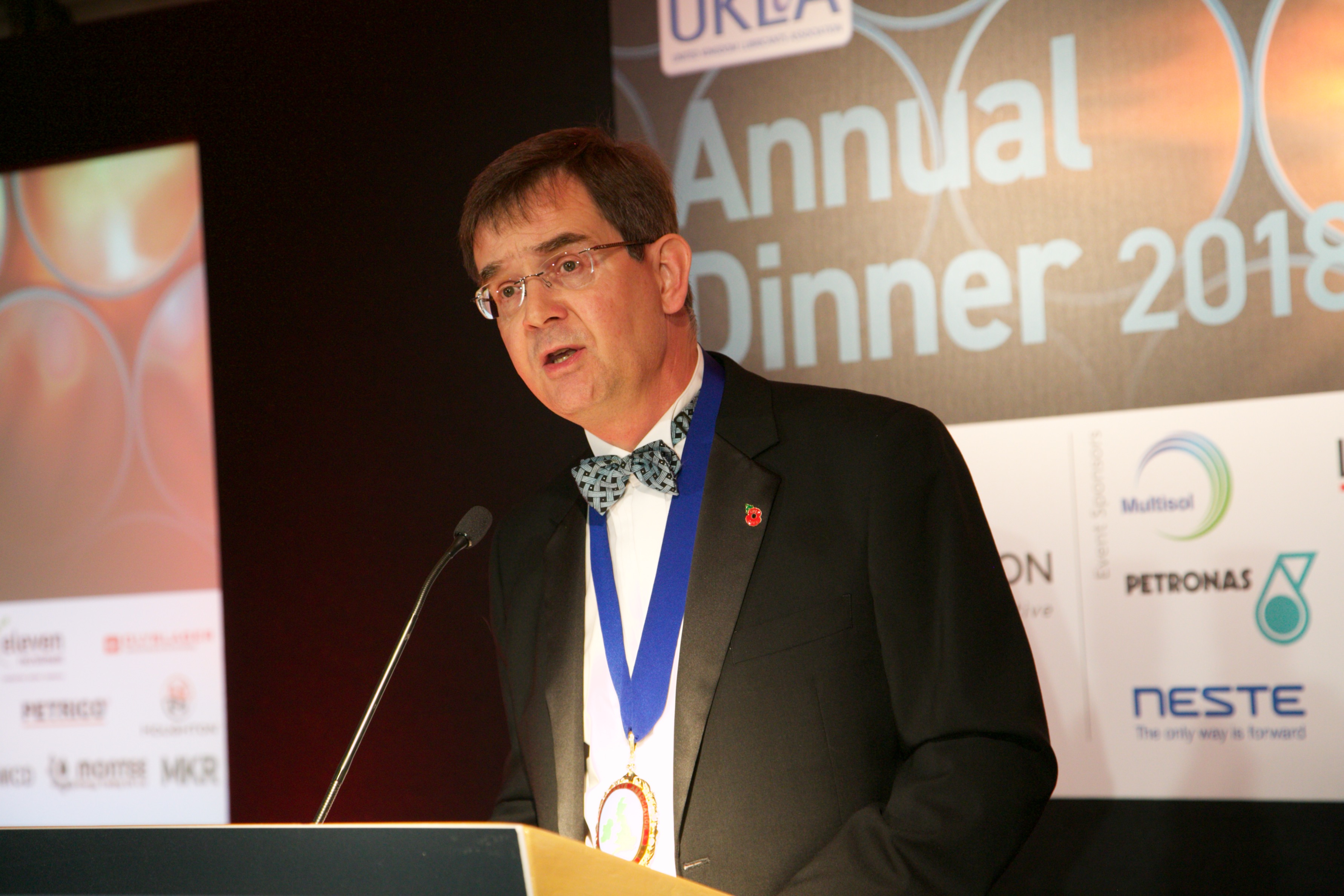
DAVID HOPKINSON ADDRESSES UKLA DINNER
Multisol Group CEO David Hopkinson, in his capacity as President of the UKLA (United Kingdom Lubricants Association), addressed guests attending the UKLA Annual Dinner on 7th November.
He covered the history and progression of the organisation, the success of the lubricants industry, the challenges it faces and a call to action to companies large or small to play its part as the industry faces one of the biggest transformations in its history.
Below are some extracts from David’s speech;
It was 1918 when the first steps were taken to form the National Lubricating Oil & Grease Federation which came into being a few years later in 1921. The Federation evolved and fifty years ago, in August 1968, it became the British Lubricants Federation, and ultimately, in 2005, the United Kingdom Lubricants Association.
So, in some ways, 2018 was a milestone year for the Lubricants industry in the UK, especially for the association which has aimed to serve the industry over those years, with its mission, to achieve and sustain a progressive and viable UK Lubricants industry, and its long term goal, of securing an industry that is among the most innovative, quality-focused and internationally competitive in the world.
Whilst it might be interesting to look back at the progress made over the years, the lubricants industry in the UK has been successful by seeking to meet the challenges of the future, in the UK, in Europe and globally. Ours is a vital industry, literally as well as metaphorically, in keeping the world moving, in all forms of transportation, as well mining, manufacturing, food and pharmaceuticals, agriculture, energy generation. The list is endless and without us, nothing moves, across the world.
In reputation, I think we are sometimes seen as just a small part of the wider oil industry, and in the public’s perception, we are often viewed with the rest of the oil industry as a cause of pollution and a barrier to a sustainable planet. In reality, we are an important part of the solution to a low carbon, energy-efficient world. Some experts estimate that approximately 30% of all energy is wasted through friction, heat, wear and corrosion. As an industry, we already contribute substantially to fuel and energy saving. But just think what even a 1% or 2% further improvement in fuel efficiency from lubricants could contribute with 1 or 2 billion cars on the world’s roads? The potential savings and the benefits for the environment we can bring are enormous.
As we look forward, I think we stand at a crucial time in our industry’s future, as well as in the UK’s future. It is always tempting to think that your challenges are greater than those faced by others before, but I do think the global lubricants industry faces one of the biggest transformations in its history. How will we address the need to become more sustainable in our practices, and to demonstrate the benefits we bring to customers, consumers, and other stakeholders, through further energy savings and technical progress, including potentially through renewable lubricants?
How will we contribute to the low carbon economy of the future?
What will be the impacts on our industry of the International Maritime Organisation regulations, to substantially reduce sulphur oxide emissions from ships from 2020?
How will manufacturing take advantage of the potential benefits of 3-D printing?
How will we recruit the future talent needed in our industry, and position ourselves as an attractive industry with an exciting and viable future?
Maybe above all, what will be the impact of the electrification of passenger vehicles, whether through all-electric cars, plug-in hybrid vehicles, fuel cells, or other solutions? All of these will require lubricants and possibly more than an internal combustion engine does today.
We hear a lot these days in the context of Brexit of the importance of “frictionless trade” ….and as specialists in the field of lubricants, we should be the experts in “frictionless trade”!
It is vital that the UK Lubricants industry is represented in discussions with policy makers in the UK, in Europe and globally, to make sure our view is heard, and as far as possible, to ensure there are practical and well-informed policies affecting our industry.
So my appeal to all of you involved directly or indirectly in the UK lubricants industry or from elsewhere in Europe and beyond, is to get involved with opinion leaders and policy makers in your countries, and also through your marketing and social media, to make the case for our industry, as value creators who contribute substantial benefits to society and the environment.
Remember the old adage that if you are not at the table, you are the lunch! And please don’t think your company or organisation is too small to be influential. The appeal of a family-run or small or medium sized business is often more powerful than the larger ‘beasts’ who are expected to look after themselves!
Our industry, along with the rest of the world, is undergoing major transformation. But I am sure that with the resilience, energy and ingenuity which this industry has demonstrated in the past, we can look forward to a prosperous and sustainable future for many years to come.